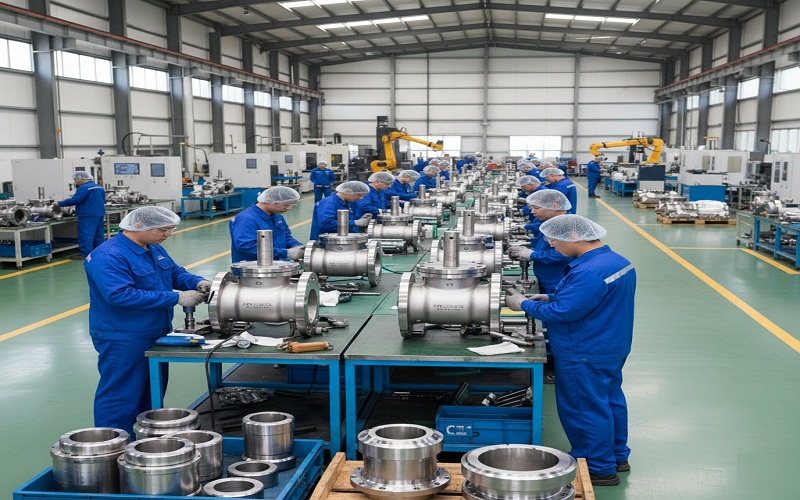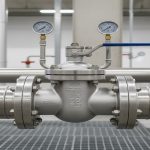The movement of fluids and gases is inevitable in industrial systems. These flow abilities are inherent to the system’s function. Flow control is crucial in various industries. This includes chemical processing, oil refineries, water treatment systems, and high-pressure industrial applications. There are many kinds of valves in existence, which is why the Stainless steel ball valve manufacturer has made a name for itself because it is known to be durable and impermeable. Their engineering design and material advantages make them indispensable for industries. These are industries that cannot afford operational failures, contamination, or safety hazards.
The Value of Durability of Industrial Valves
Industrial pipelines are subject to rough and uncertain environments. Temperature shocks, pressure surges and corrosive as well as abrasive agents continually attack the material of system elements. A valve that cannot withstand long-term use can become the system’s weak link. This may cause interruptions, hydrocarbon leaks, and even potential safety hazards. All the issues listed above are countered by stainless steel ball valves, which have superior mechanical strength. Stainless steel provides tensile strength and high resistance to impact and external pressure. It does not become brittle at low temperatures and maintains its structural integrity. This stability ensures that the valve body stays fixed during use. It can maintain its position even in high-pressure, high-temperature, or chemically aggressive systems.
Engineered for a Leak-Proof Operation
One of the more beneficial factors associated with ball valves is that they offer a tight shut off. The ball is precision fitted into the valve, allowing sealing surface contact to be perpendicular to the line of flow. Designed in stainless steel, this valve achieves absolute sealing efficiency. Thermal expansion, corrosion, and erosion do not affect the contact between the ball and seat. In processing industries such as petrochemical and oil, a leak can cause contamination, equipment damage, loss of revenue and environmental compliance penalties. Stainless steel ball valves alleviate this issue and provide reliable and tight shut-off after many years of service.
Highest resistance to corrosion and chemical attack
Corrosion is a formidable problem in industrial flow control. Hands-on With acids, sea water, hydrocarbons and many aggressive chemicals weaker products simply don’t last. The stainless steel also provides resistance to both rust and chemical in the valve, which is aviation hydraulic factory laboratory. Used for controlling pilots or diaphragms of larger direct operated pressure regulating valves. These include grades such as 304 and 316 that offer protection against chloride induced corrosion, oxidation resistance, and chemical reactions. This feature not only protect the structure of valve, but also keep the purity of media transmission, which is critical to food and pharmaceutical applications.
High Pressure High Temperature Stability
In some cases processing systems involve high temperature and pressure conditions that may warp conventional valves. A valves are suitable for high pressure, Â passage of cryogenic gases and wide range of operating temperatures operations. Their seats and insides have been designed to resist abrasion and heat expansion so they can still function. This makes them perfect for high pressure steam lines, crude oil pipelines, chemical reactors and industrial boilers that would degrade or fail from lesser materials.
Efficient Flow with Less Pressure Drop
Stainless steel ball valves offer high flow rates due to its full bore design and surface. The valve allows fluid or gas to flow through without the pressure losses of a conventional style gate. Lower energy loss means pumps and compressors need less power to keep flow rates, resulting in great savings on energy. Such an advantage is especially critical in large industrial plants where the slightest increase in pressure over thousands of cycles provides demonstrable performance and operating cost advantages.
Reliability for Long Term Industrial Use
The durability of stainless steel ball valve is one of its major advantages. The impact strength, corrosion resistance, abrasion resistance and sealing performance characteristics of these valves enable them to provide years of service without the need for frequent maintenance or replacement. Their high ball surface provides an increased fill capacity offering a smooth flow of ink, while the balls are made from stainless steel. The durability of stainless steel ball valves minimizes downtime and the requirement for round the clock valve monitoring, an important benefit in remote locations or continuous processing plants.
Interfacing Automation and State-of-the-Art Systems
Automation of the moulding process and procedures enable precision control and safety. Stainless steel ball valves are an ideal solution for industrial and commercial applications due to their low torque, as well as quarter turn operation. The actuators may be electric, pneumatic or hydraulic and fixed in position for visualization and live flow regulation. This integration enables businesses to consistently maintain throughput, maximize energy use and quickly react to emergencies without human intervention.
Total Value beyond Initial Investment
Stainless steel ball valves are usually a little more expensive than some of their counterparts, in terms of up-front cost, but the return is greater in value over time. With long lives, leak-proof operation, minimal maintenance and energy efficiency, pumps offer final hose-down up to 93° C for maximum hygiene. In markets where system downtime is costly and safety imperative, stainless steel ball valves offer measurable economic benefits and operational advantages.
Conclusion
Designed for maximum strength and minimal leak points, steel ball valve manufacturer are best utilized for controlling flow. Their resistance to very high pressure and temperatures, anti-corrosiveness, the prevention of energy loss or the possibility to integrate it into automation systems makes them an indispensable part (component) of today’s industrial plants. Whether you work in the chemical and oil processing industry or set up water treatment systems for a living, your business can’t function without stainless steel ball valves. While designs will continue to develop alongside performance requirements, stainless steel ball valves remain a cornerstone for contemporary flow control needs.



